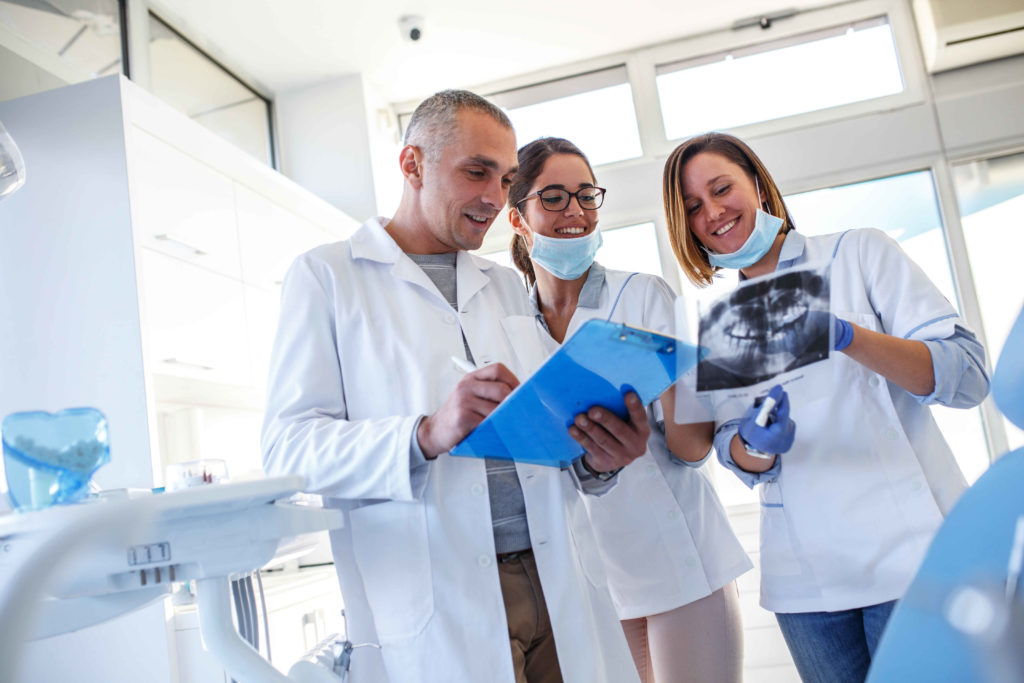Would you like to become a dentist in Switzerland? Is your child interested in studying dentistry? The HELVIDENT team can tell you more about the training you need, the course you'll follow and the prospects for this profession.
How do you train to become a dentist in Switzerland?
To be admitted, you must first obtain a maturité gymnasiale (or equivalent qualification) and pre-register by February 15 on the following website swissuniversities.
University studies take place at the Faculty of Medicine in Geneva:
- 6 semesters for the Bachelor's degree (basic sciences, basic medical sciences, propaedeutic and clinical dentistry);
- 4 additional semesters for the master's degree (clinical experience, medical-dental activity, daily clinical activity).
You should know that the first 2 years are shared with human medical studies.
At the end of your training, you will receive a Master's degree in dentistry. You can then register to take the examination for the Federal Diploma in Dentistry.
What does it mean to be a dentist?
Dentists prevent, detect and treat diseases and abnormalities affecting the teeth and oral cavity. Beyond aesthetic concerns, good oral hygiene helps to maintain chewing and speaking functions.
On a daily basis, dentists welcome their patients and carry out a clinical examination of the oral cavity. Among the routine dental procedures The services he provides include scaling, caries care, panoramic radiography and gingivitis treatment. This oral health professional also advises his patients on how to improve their oral hygiene (brushing, diet, etc.).
The dentist also performs minor surgical operations under local anaesthetic: tooth extraction, periodontal procedures, installation of dental prostheses (bridges, crowns), artificial root implants, etc. In the case of jaw fractures or congenital malformations, he or she may work in collaboration with a maxillo-facial surgeon.
Finally, the dental practitioner is required to carry out administrative tasks, such as keeping patient records up to date. If they work in private practice, they must also manage the dental practice and supervise their team (assistants and dental hygienists).
What opportunities are there for young dentists in Switzerland?
As a rule, young dental graduates start out as assistants for three to five years. They may be employed by the university, a private dental practice or a hospital.
After this period, they can open their own practice, on their own account. Some prefer to join forces with other dentists to share costs and work as a team. A minority devote themselves to research or teaching.
Young dentists are more likely to find employment in rural areas than in large cities. Since the entry into force of the bilateral agreements (June 2002), the law on medical professions has made it possible to consider practising the profession in certain countries of the European Union.
How to perfect your dental skills?
To practice in Switzerland, a dentist must have completed his or her medical training. This is both a legal and ethical obligation.
Professionals can continue their training by attending conferences and courses organized by the SSO, university institutes or the dental industry.
Dentists who wish to improve their skills can specialize in one of the following areas:
- Micoinvasive pediatric dentistry (Master of advanced studies in Geneva, 2 years on the job) ;
- Microinvasive aesthetic dentistry (Master of advanced studies in Geneva, 2 years on the job) ;
- Digital Dental Technologies (Master of advanced studies in Geneva, 2 years in employment) ;
- Orthodontics (Master of advanced studies in Geneva, 4 years in employment) ;
- Doctorate in Dental Medicine.
For further details, please consult :
- the Swiss Society of Dental Surgeons SSO
- theUniversity of Geneva
- the official Swiss information portal for vocational, academic and career guidance
At HELVIDENT, our team is made up of trained professionals: dentists, dental hygienists and specialists. You'll find all the dental professions under one roof. Don't hesitate to contact one of our three dental clinics or centers in Lausanne, Fribourg or Aigle.

